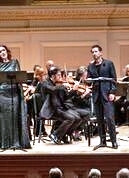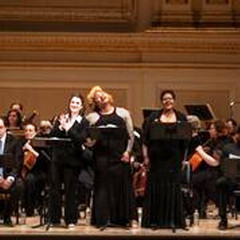|
Back
Dreams Within Dreams Within... New York
Isaac Stern Auditorium, Carnegie Hall
03/22/2019 -
Bohuslav Martinů: Julietta, or The Key to Dreams, H. 253 (New York Premiere)
Sara Jakubiak (Julietta), Aaron Blake (Michel), David Cangelos (Police Chief, Clerk), Alfred Walker (Man with Helmet, Memory Vendor, Beggar), Kevin Burdette (Man in Window, Old Man Youth, Convict), Rebecca Jo Loeb (Young Arab, 1st Man, Young Sailor, Bellhop), Philip Cokorinos (Old Arab, Grandfather, Old Sailor), Tichina Vaughn (Bird Seller, 2nd Man, Palm Reader), Raehann Bryce-Davis (Fish Seller, 3rd Man, Grandmother, Old Lady)
Bard Festival Chorale, James Bagwell (Director), American Symphony Orchestra, Leon Botstein (Director/Conductor)

S. Jakubiak, A. Blake, L. Botstein (© Matt Dine)
“The dream is the small hidden door in the deepest and most intimate sanctum of the soul, opening to that primeval cosmic night...to a soul far beyond what a conscious ego could ever reach.”
Carl Jung
What eccentric god prompted the very first Martinů music I ever heard to be the complete opera Julietta? An old Supraphon recording, the name of the composer barely known. Yet then–like the unnamed dreamers of the unnamed town of Julietta itself –I had been obsessed throughout my life with the secret beauty of this most strange opera.
Secret, not only because one never quite knows what underlies this dream-play. More practically secret since nobody in America has ever seen fit to produce Julietta. Secret because no filmmaker has yet transformed Julietta’s long puzzling list of characters into a dream itself, with all the special effects that Martinů himself might have admired.
My adolescent fantasies came to semi-light last night with the American premiere of a semi-staged Julietta by the always innovative Leon Botstein. Alas, no, we didn’t have that Act Three door to the Dreamers Bureau, we didn’t have the cloudy forest with its merchant of dreams, or the women dressed like men or the Arab boy or the figures or the quack-quack ducks or screams of Krokodil! Krokodil or the mythic figures or the lights from windows or dark alleys or nonsensical fortune-telling and palm-reading, or a Lady-Man with a French horn on her shoulder.
That came from the imagination of Polish-French writer Georges Neveux, and had to remain in our own imaginations.
We did have the American Symphony Orchestra and chorus, and Leon Botstein. And a large cast of fine singers who tried the best they could do stage the hallucinations.
And most memorable of all, we had the music of Bohuslav Martinů, probably the best music of this most fecund of composers. For just when one thinks that maybe Martinů had used too many characters in Julietta, too many figures have come out of the mist...well, at that point, the music comes up in a grand rush, and we forget our hesitation. The motifs (hardly melodies) could be grand and religious, they could drip sensuous I>Pelléas-style notes. Or they could soar upward and onward into the air and lightly float down.
Yet not once in this opera, did Martinů produce anything which was tawdry or off-the-cuff. Even the frequent dialogue (spoken in English) had a rhythm, a lost-in-space word tactility!
This writer knew what was in store for an understandably unwitting audience. But the written libretto–which really should have been splashed across the screen so we didn’t need to refer to our programs–was fascinating to everybody.
In fact, it was a rare audience member aware that Julietta was a Chinese box of dreams within dreams.
Michel, a placid traveling bookseller, has been transfixed by the song and face of Julietta, and he returns to that village to find her. What he finds instead is a village whose people have theoretically lost their memory. Though logically, you cannot lose what you never had. So instead of memory, they make up stories–which are immediately forgotten.
He finds Julietta, and she pretends that she knew him, and they would rendezvous in a forest. In that forest, when he confesses his love, she finds him “silly” and flees. And in Act Three, Michel again finds her. Though Julietta is not a woman at all: she is an idea (or a Platonic Idea), longed for by everybody. Everybody in a Bureau of Dream has near fulfillments. But even their failures are quite satisfactory. After all, they are only dreams. Images which we cannot ever question.
Does Michel succumb to join the dreamers? Does he stay sane? And when he almost realizes that Julietta is nothing but a mirage to their vast people of the cast, what is his choice?
To sleep? Perchance to dream? That was Hamlet’s problem as well. But he only had John Dowland’s lute melodies to console him. The American Symphony Orchestra had the lush, rich, vibrating sometimes towering melodies of that great Czech composer who himself felt he had no country.
This tells nothing of the musical magic performed and partly acted by a few dazzling performers. Michel is the only “real” person, so his fine tenor voice needs changes of drama. He begins with a real search, suddenly finds himself honored in this town (he actually has a memory of a toy duck!), he begins a love duet with Julietta.
Yet Sara Jakubiak must take on her own “unreal” character. After the surreal mundane beginnings in the town, her entrance became all too operatic. Yet such a soprano voice was not to be belittled. She could joke, she could fret, in the dreams she could be angry and soft. The figment of a superb imagination.
Others in the cast had multiple roles. Particularly stunning was Alfred Walker, a bass-baritone who was a memory huckster or a poor beggar. And Kevin Burdette, who supposedly played his accordion (offstage solos by Denise Konocelik). The humor–sometimes a dark humor–were provided by the virago fishwives, Raehann Bryce-Davis and Tichina Vaughn.

R. J. Loeb, T. Vaughn, R.Bryce-Davis (© Matt Dine)
That group, placed on different areas of the podium, was complemented by the Bard Festival Chorale and of course the orchestra. Commanding the orchestral ensemble couldn’t have been easy. The music drifts with dreamy easiness, or it stands up with quasi-hymns that could be French or Czech. Masses of solos–French horn, English horn, oboe and luscious piano work–yet nothing stands out as much as the ensemble orchestra by itself.
Rather, what stands out is the entirety of the work. What is the equivalent ? Not the sophisticated urban Czech dreams of Kafka. (Though the Buffalo Bill dream could have come out of Amerika.) Not the symbols of Freud. (Since nothing is outside the dreamworld, symbols have no symbolic meaning.) Not the myths of Joseph Campbell or the 20th Century surrealistic forays by French painters.
Rather Julietta is in a category of its own. The Neveux play could be close to Strindberg’s own Dream Play. Possibly Ravel or Roussel could have written incidental music. But Martinů, coming from a country with roots both east and west, had to be alone.
His was a rich gift. Now we need the even richer gift. A full staging, a tasteful filming, to bring this shadowy masterpiece out of its undeserved shadows.
Harry Rolnick
|